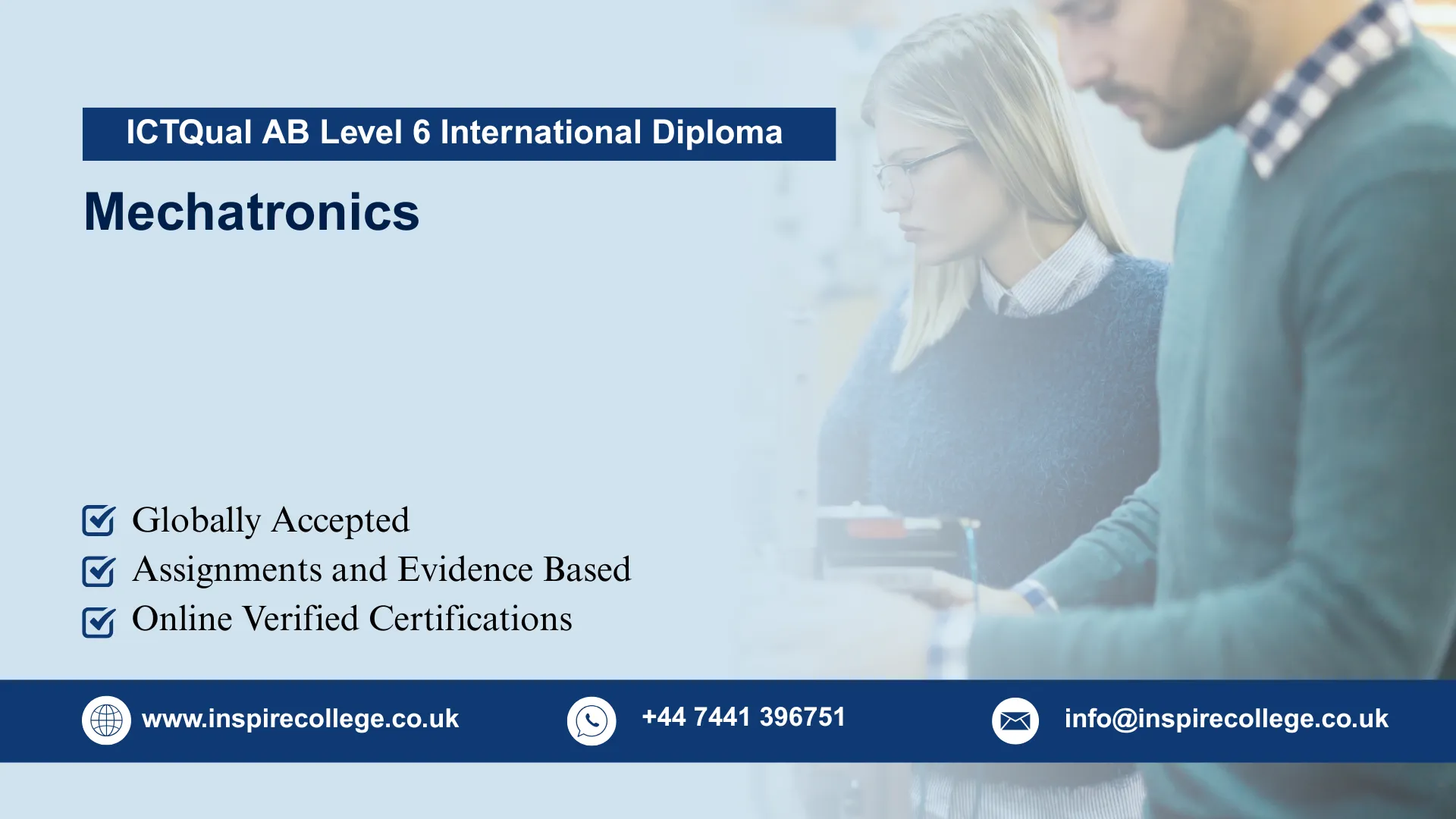
ICTQual AB Level 6 International Diploma in Mechatronics
In today’s rapidly evolving industrial and technological landscape, Mechatronics has emerged as a crucial field that integrates mechanical, electrical, and computer engineering to develop advanced automated systems and smart technologies. The ICTQual AB Level 6 International Diploma in Mechatronics is designed to equip learners with the interdisciplinary knowledge and practical expertise required to excel in modern engineering environments.
This three-year, 360-credit programme is tailored for both freshers and professionals seeking to build or enhance their careers in robotics, automation, manufacturing, and industrial control systems. Learners will gain a solid foundation in mechanical design, electronics, computer control systems, and industrial automation, combined with advanced problem-solving and analytical skills. The course also covers the practical application of robotics, PLC programming, sensor integration, and automation technologies, ensuring that graduates are industry-ready.
Throughout the programme, students will engage in hands-on projects, laboratory work, and real-world simulations that foster critical thinking, innovation, and technical competence. Graduates will be capable of designing, implementing, and managing mechatronic systems across diverse sectors, including manufacturing, aerospace, automotive, and research and development.
By completing this internationally recognised diploma, learners not only acquire advanced technical and engineering skills but also develop strategic problem-solving, project management, and teamwork abilities essential for professional success. This qualification opens pathways to a wide range of career opportunities in mechatronics engineering, industrial automation, and robotics, while also serving as a strong foundation for further postgraduate studies in advanced engineering, robotics, or automation technologies.
The ICTQual AB Level 6 International Diploma in Mechatronics is designed for learners who aspire to develop advanced technical expertise in mechanical, electrical, and automation systems. To ensure learners can succeed in this comprehensive programme, the following entry requirements apply:
Age Requirements
- Learners must be at least 18 years old at the time of enrolment.
Educational Requirements
- Completion of secondary education (high school diploma or equivalent) with strong performance in mathematics, physics, or engineering-related subjects.
- Alternatively, completion of an ICTQual AB Level 5 Diploma in Engineering, Mechatronics, or a related technical field is recommended.
Professional Experience
- Fresh learners may enrol directly with no prior work experience.
- Candidates with relevant work experience in mechanical, electrical, or automation engineering are encouraged to apply, as practical knowledge can enhance learning outcomes.
English Language Proficiency
- Learners must demonstrate proficiency in English for academic purposes, through prior education or recognised English language qualifications (e.g., IELTS 5.5+ or equivalent).
This structured entry framework ensures that all learners, whether fresh school leavers or experienced professionals, are adequately prepared to thrive in the rigorous and practical learning environment of the Mechatronics programme. By meeting these entry requirements, learners are positioned to gain the technical expertise, practical skills, and international recognition necessary for a successful career in mechatronics engineering and automation.
Mandatory Units
This qualification, the ICTQual AB Level 6 International Diploma in Mechatronics 360 Credits – Three Years, consists of 36 mandatory units.
Year 1 – Foundation in Mechatronics
- Principles of Mechanical Engineering
- Fundamentals of Electrical and Electronic Engineering
- Engineering Mathematics
- Introduction to Computer Programming
- Materials Science and Engineering
- Engineering Drawing and CAD
- Basics of Control Systems
- Digital Logic and Microprocessors
- Sensors and Instrumentation
- Fundamentals of Robotics
- Health, Safety and Environmental Practices in Engineering
- Communication and Technical Report Writing
Year 2 – Intermediate Studies in Mechatronics
- Advanced Electrical and Electronic Systems
- Applied Thermodynamics and Fluid Mechanics
- Microcontrollers and Embedded Systems
- Automation and PLC Programming
- Mechanical Design and Manufacturing Processes
- Dynamics and Vibration Analysis
- Power Electronics and Drives
- Robotics Systems and Applications
- Mechatronic System Design
- Data Acquisition and Signal Processing
- Industrial Maintenance and Reliability Engineering
- Project Planning and Management in Engineering
Year 3 – Advanced Studies in Mechatronics
- Intelligent Systems and Artificial Intelligence in Engineering
- Advanced Control Engineering
- Robotics and Autonomous Systems
- Smart Manufacturing and Industry 4.0
- Renewable Energy Systems and Applications
- Advanced Computer-Aided Design and Simulation
- Cyber-Physical Systems and IoT in Engineering
- Advanced Mechatronic System Integration
- Engineering Research Methods
- Professional Ethics and Sustainability in Engineering
- Innovation and Entrepreneurship in Technology
- Final Year Major Project (Capstone Project)
The ICTQual AB Level 6 International Diploma in Mechatronics equips learners with the interdisciplinary knowledge, technical expertise, and practical skills required to excel in modern engineering environments. Upon completion, graduates will be able to design, implement, and manage advanced mechatronic systems across various industries.
Year 1 – Foundation in Mechatronics
Principles of Mechanical Engineering
- Understand core mechanical engineering concepts, including mechanics, dynamics, and material properties.
- Apply mechanical principles to solve real-world engineering problems.
- Develop foundational skills for designing and analysing mechanical components.
Fundamentals of Electrical and Electronic Engineering
- Gain knowledge of electrical circuits, signals, and systems.
- Apply electronic principles in practical laboratory settings.
- Develop problem-solving skills in basic electronics and electrical systems.
Engineering Mathematics
- Master mathematical techniques essential for engineering analysis.
- Apply calculus, algebra, and statistics to solve engineering problems.
- Enhance analytical thinking for practical engineering applications.
Introduction to Computer Programming
- Understand fundamental programming concepts and logic.
- Write and debug basic programs for engineering applications.
- Apply computational skills to automate calculations and simulations.
Materials Science and Engineering
- Understand material properties and selection criteria for engineering designs.
- Analyse the behaviour of metals, polymers, and composites.
- Apply material science knowledge to design durable and efficient systems.
Engineering Drawing and CAD
- Develop skills in technical drawing and interpretation.
- Use CAD software to create and modify engineering designs.
- Produce accurate schematics for mechanical and electronic components.
Basics of Control Systems
- Understand feedback mechanisms and control system fundamentals.
- Analyse simple control systems using theoretical and practical methods.
- Apply control principles to improve system stability and performance.
Digital Logic and Microprocessors
- Understand digital logic design and microprocessor architecture.
- Develop practical skills in programming and interfacing microprocessors.
- Apply digital systems knowledge in mechatronic applications.
Sensors and Instrumentation
- Gain knowledge of sensor types, working principles, and applications.
- Integrate sensors for monitoring and control in mechatronic systems.
- Apply instrumentation techniques to ensure accurate system performance.
Fundamentals of Robotics
- Understand robot structures, kinematics, and basic programming.
- Apply robotics principles in practical simulations and labs.
- Develop foundational skills for advanced robotics applications.
Health, Safety and Environmental Practices in Engineering
- Understand safety protocols and environmental regulations.
- Apply risk assessment and mitigation strategies in engineering tasks.
- Promote sustainable and safe engineering practices.
Communication and Technical Report Writing
- Develop technical writing skills for professional documentation.
- Present engineering data clearly and accurately.
- Communicate complex engineering concepts effectively in written form.
Year 2 – Intermediate Studies in Mechatronics
Advanced Electrical and Electronic Systems
- Analyse complex circuits and systems for practical engineering applications.
- Develop troubleshooting and problem-solving skills in electrical systems.
- Integrate advanced electronic components into mechatronic projects.
Applied Thermodynamics and Fluid Mechanics
- Understand thermodynamic and fluid dynamic principles for engineering applications.
- Apply calculations for energy transfer, efficiency, and fluid flow.
- Solve real-world problems involving heat and fluid systems.
Microcontrollers and Embedded Systems
- Program and interface microcontrollers for automation tasks.
- Design embedded systems for control and monitoring applications.
- Apply embedded solutions in industrial and robotics contexts.
Automation and PLC Programming
- Develop practical skills in PLC programming for industrial automation.
- Implement automated control systems in simulated and real environments.
- Analyse and optimise automated processes for efficiency and reliability.
Mechanical Design and Manufacturing Processes
- Design mechanical components considering functionality and manufacturability.
- Apply manufacturing techniques for production and prototyping.
- Integrate mechanical design with electronic and control systems.
Dynamics and Vibration Analysis
- Analyse dynamic systems and vibrations in mechanical structures.
- Develop solutions to minimise adverse effects in engineering applications.
- Apply theoretical concepts in practical engineering simulations.
Power Electronics and Drives
- Understand power electronic devices and motor drives.
- Apply drive control techniques in mechatronic systems.
- Analyse and implement efficient power conversion solutions.
Robotics Systems and Applications
- Apply robotic kinematics, dynamics, and programming in projects.
- Integrate sensors, actuators, and control systems in robotic solutions.
- Develop hands-on expertise in building and testing robotic systems.
Mechatronic System Design
- Design integrated mechanical, electrical, and control systems.
- Apply systems thinking to develop efficient mechatronic solutions.
- Use simulation tools to optimise system performance.
Data Acquisition and Signal Processing
- Collect, analyse, and interpret engineering data from sensors.
- Apply signal processing techniques to enhance system performance.
- Integrate data-driven insights into mechatronic applications.
Industrial Maintenance and Reliability Engineering
- Understand maintenance strategies for complex systems.
- Implement reliability analysis and preventive maintenance techniques.
- Ensure system uptime and operational efficiency.
Project Planning and Management in Engineering
- Develop skills in project scheduling, resource management, and budgeting.
- Apply project management tools to engineering projects.
- Coordinate team activities to achieve project objectives.
Year 3 – Advanced Studies in Mechatronics
Intelligent Systems and Artificial Intelligence in Engineering
- Understand AI applications in automation and smart systems.
- Apply machine learning techniques to enhance system performance.
- Develop AI-driven solutions for advanced mechatronic systems.
Advanced Control Engineering
- Design and analyse advanced control systems for complex applications.
- Implement modern control strategies to optimise system behaviour.
- Integrate control solutions in industrial and robotic systems.
Robotics and Autonomous Systems
- Develop autonomous robotic solutions for real-world applications.
- Implement navigation, sensing, and decision-making algorithms.
- Test and evaluate robotic systems for efficiency and reliability.
Smart Manufacturing and Industry 4.0
- Apply digital manufacturing and automation principles in Industry 4.0.
- Integrate IoT, sensors, and data analytics in smart production systems.
- Enhance manufacturing efficiency through modern technologies.
Renewable Energy Systems and Applications
- Understand renewable energy technologies and system integration.
- Apply energy conversion principles in engineering projects.
- Design sustainable solutions for energy-efficient mechatronic systems.
Advanced Computer-Aided Design and Simulation
- Use advanced CAD and simulation tools for complex system design.
- Validate engineering designs through virtual testing.
- Optimise designs for performance, cost, and safety.
Cyber-Physical Systems and IoT in Engineering
- Integrate physical systems with computational and networking technologies.
- Develop IoT-enabled engineering solutions for monitoring and control.
- Apply cyber-physical concepts in smart automation projects.
Advanced Mechatronic System Integration
- Combine mechanical, electronic, and software components into unified systems.
- Test, troubleshoot, and optimise integrated systems for reliability.
- Deliver practical, industry-ready mechatronic solutions.
Engineering Research Methods
- Develop skills in research methodology, data collection, and analysis.
- Apply evidence-based approaches to solve engineering challenges.
- Document and communicate research findings effectively.
Professional Ethics and Sustainability in Engineering
- Understand ethical considerations in engineering practice.
- Apply sustainability principles in system design and operations.
- Promote responsible and socially-conscious engineering solutions.
Innovation and Entrepreneurship in Technology
- Identify opportunities for technological innovation and commercialisation.
- Develop business models for engineering products and services.
- Enhance entrepreneurial skills for technology-driven enterprises.
Final Year Major Project (Capstone Project)
- Apply cumulative knowledge to design and implement a real-world mechatronic system.
- Demonstrate project management, technical problem-solving, and innovation skills.
- Present and document solutions according to professional engineering standards.
By completing this comprehensive programme, learners acquire the advanced knowledge, practical expertise, and professional competencies required to excel in mechatronics engineering, automation, and robotics industries worldwide.
The ICTQual AB Level 6 International Diploma in Mechatronics is designed for motivated learners seeking to develop expertise in mechanical, electrical, and computer engineering integration. This programme is ideal for:
1. Fresh School Leavers
- Recent secondary school graduates aiming to build a strong foundation in mechatronics.
- Gain hands-on skills and theoretical knowledge to start a career in engineering, robotics, or automation.
- Prepare for advanced studies or technical roles in high-demand industrial sectors.
2. Aspiring Engineering Professionals
- Individuals seeking to enter manufacturing, automation, robotics, or technology industries.
- Acquire practical skills in system integration, control engineering, and smart manufacturing.
- Develop problem-solving abilities for real-world engineering challenges.
3. Current Technicians and Engineers
- Professionals with experience in mechanical, electrical, or electronics fields aiming to specialise in mechatronics.
- Enhance technical competencies and leadership potential for advanced roles.
- Prepare for cross-disciplinary project management and innovation-driven tasks.
4. International Learners
- Students worldwide aiming for an internationally recognised qualification in mechatronics.
- Gain a globally relevant skill set suitable for diverse engineering systems and industries.
- Develop cross-cultural awareness and adaptability in technology-driven environments.
5. Career Changers
- Individuals from non-engineering backgrounds interested in technology, robotics, and automation.
- Build technical competence and practical expertise to transition into the mechatronics field.
- Access structured learning pathways for career growth in engineering and industrial innovation.
Why This Diploma is Ideal
Provides practical and theoretical knowledge in mechanical, electrical, control, and computer engineering integration.Prepares learners for professional and managerial roles in automation, robotics, and mechatronics.Supports global career opportunities and provides a strong foundation for further postgraduate studies.
As an approved ICTQual AB centre, we provide learners with the opportunity to enrol in the ICTQual AB Level 6 International Diploma in Mechatronics through structured certification routes designed for both experienced professionals and fresh learners.
1. Certification Route for Experienced Professionals
- Designed for learners with at least 6 years of verifiable experience in mechanical, electrical, electronics, automation, or mechatronics-related fields.
- Professionals can fast-track their certification by submitting a portfolio of work demonstrating relevant skills, achievements, and technical expertise.
- Prior practical experience is assessed to ensure it aligns with the standards of the Level 6 diploma.
- Upon successful verification, learners will be awarded the ICTQual AB Level 6 International Diploma in Mechatronics without completing the full set of assignments, recognising their professional competence and experience.
2. Certification Route for Fresh Learners
- Suitable for recent graduates or individuals with limited professional experience in engineering, mechatronics, or automation.
- Learners are required to complete all 36 assignments covering theoretical knowledge, practical applications, robotics, control systems, and smart manufacturing.
- Assignments are structured to progressively develop skills in mechanical and electrical integration, PLC programming, system design, project management, and problem-solving.
- Successful completion of all assignments leads to the award of the ICTQual AB Level 6 International Diploma in Mechatronics, ensuring mastery of the programme content and practical competencies.
Enrolment is available directly through our approved ICTQual AB centre, providing learners with full support, access to study materials, and guidance throughout their learning journey. Whether you are an experienced professional seeking recognition for your expertise or a fresh learner aiming to build a strong foundation, our certification routes offer a globally recognised pathway to success in mechatronics and engineering technologies.
Register Now
FAQs for ICTQual AB Level 6 International Diploma in Mechatronics






